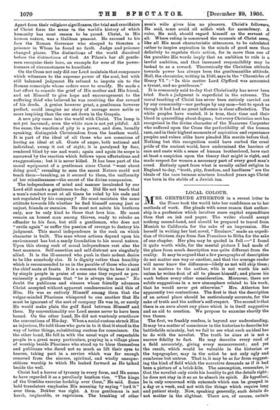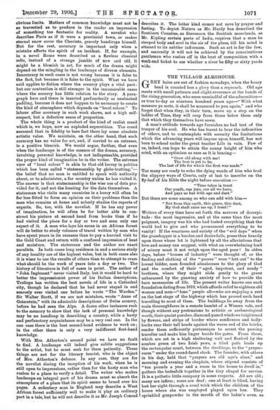LOCAL COLOUR.
MRS. GERTRUDE ATHERTON in a recent letter to the Times took the world into her confidence as to her methods of work. She pleads with some reason that author- ship is a profession which involves more capital expenditure than that on ink and paper. The writer should accept nothing second-band, and should be prepared to travel from Munich to California for the sake of an impression. She herself in writing her last, novel, " Rethnov," made an expedi- tion of thirteen days from San Francisco to Sitka for the sake of one chapter. Her plea may be quoted in full :—" I found it quite worth while, for the mental picture I had made of the place from, much description was quite different from the reality. It may be argued that a few paragraphs of description do not matter one way or another, and that the average reader will never know the difference—likely as net will skip them; but it matters to the author, whb is not worth his salt unless he writes first of all to please himself; and places his work before every other consideration. Moreover, there are subtle suggestions in a new atmosphere related to his work, that he would never get otherwise." Mrs. Atherton has apparently two contentions. The first is that the description of an actual place should be meticulously accurate, for the sake of truth and the author's self-respect. The second is that there is an aura about any place which is in itself suggestive and an aid to creation. We propose to examine shortly the two theses.
The first, we frankly confess, is beyond our understanding. It may be a matter of conscience in the historian to describe his battlefields minutely, but we fail to see what such an ideal has to do with the novelist. The truth he aims at is not a narrow fidelity to fact. He may describe every rood of a field accurately, giving every measurement ; and yet the result, which would be valuable in the historian or the topographer, may in the artist be pot only ugly and cumbrous but untrue. That is, it may be as far from suggest- ing the kind of field which the narrative demands as if it had been a picture of a brick-kiln. The assumption, remember, is ,that the novelist only visits his locality to get the details right: he does not stay in it so as to absorb its spirit. Ex hypothesi, he is, only concerned with externals which can be grasped in ,a day or a week, and not with the things which require long and patient study. Now, speaking generally, such details do not matter in the slightest. There are, of course, certain
obvious limits. Matters of common knowledge must not be so travestied as to produce in the reader an impression of something too fantastic for reality. A novelist who describes Paris as if it were a provincial town, or makes eternal snow cover the Cheviots, gravely handicaps himself. But for the rest, accuracy is important only when a mistake affects the spirit of an incident. If, for example, in a novel Rome were described as a flawless classical relic, instead of a strange jumble of new and old, it might be a blemish in art, for much of the drama might depend on the mingling in the landscape of diverse elements. Inaccuracy in such cases is not wrong because it is false to the fact, but because it is false to the spirit. What we have said applies to fiction where the scenery plays a vital part: but our contention is still stronger in the innumerable cases where the scenery has little relation to the story. A para- graph here and there is inserted perfunctorily as unabashed padding, because it does not happen to be necessary to create the kind of atmosphere which depends on "local colour." To labour after accuracy in such work shows, not a high self- respect, but a defective sense of proportion.
The whole thing is a product of the kind of realist creed which is, we hope, now an exploded superstition. The creed assumed that in fidelity to bare fact there lay some absolute artistic value. We maintain, on the other hand, that such accuracy has no value for art, and, if carried to an extreme, is a positive blemish. We would argue, further, that even when the landscape is of the essence of the drama, accuracy, involving personal knowledge, is not indispensable, provided the proper kind of imagination be in the writer. The extreme view of "local colour" is akin to that old heresy in politics which has been called "statesmanship by globe-trotting,"— the belief that no man is entitled to speak with authority about, or to administer, a far country unless he has visited it. The answer is that statesmanship is the wise use of data pro- vided for it, and not the hunting for the data themselves. A statesman who visits many countries in a hurry will often be far less fitted to form an opinion on their problems than the man who remains at home and soberly studies the reports of experts. So, too, with the novelist. If he has any power of imagination, he will often be far better able to con- ptruct his picture at second hand from books than if he had visited the place for a day or two and seen only one aspect of it. A man who lays his scene in an African forest will do better to study volumes of travel written by men who have spent years in its recesses than to pay a hurried visit to the Gold Coast and return with a confused impression of heat and moisture. The statesman and the author are exact parallels. In both cases long residence in and a serious study of any locality are of the highest value, but in both cases also it is wiser to use the results of others than to attempt to cram what should be the work of years into a day or two. The history of literature is full of cases in point. The author of "John Inglesant" never visited Italy, but it would be hard to better the impressionist power of his Italian descriptions. Trollop° has written the best novels of life in a Cathedral city, though he declared that he had never stayed in and scarcely ever visited one before he wrote "The Warden." Sir Walter Scott, if we are not mistaken, wrote "Anne of Geierstein," with its admirable descriptions of Swiss scenery, before he had seen the Alps. A dozen other instances rush to the memory to show that the lack of personal knowledge may be no handicap in describing a country, while a hasty and perfunctory acquaintance may be a very real one. In the one case there is the best second-hand evidence to work on ; in the other there is only a very indifferent first-hand knowledge.
With Mrs. Atherton's second point we have no fault to find. A landscape will indeed give subtle suggestions to the artist, but he must seek for them patiently. These things are not for the literary tourist, who is the object of Mrs. Atherton's defence. In any case, they are for the novelist during the inception of his work, when he is still open to impressions, rather than for the hasty man who rashes to a place to verify a detail. The writer who makes landscape an integral part of his drama must so absorb the atmosphere of a place that its spirit seems to brood over his pages. A sedentary man in England may describe a West African forest sufficiently well to make it play an ordinary part in a tale, but he will not describe it as Mr. Joseph Conrad
describes it. The latter kind comes not save by prayer and, fasting. To depict Nature as Mr. Hardy has described the Southern Counties, as Stevenson the Scottish moorlands, as Mr. Kipling certain parts of India, requires that a man be steeped body and soul in the air of the place, till his mind is attuned to its subtler influences. Such an art is for the few, and assuredly it will not be achieved by the conscientious gentleman who rushes off in the heat of composition with a week-end ticket to see whether a river be fifty or sixty yards wide.



































 Previous page
Previous page